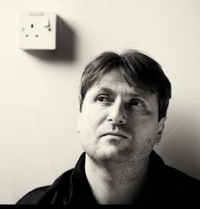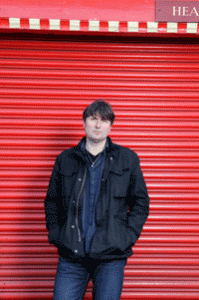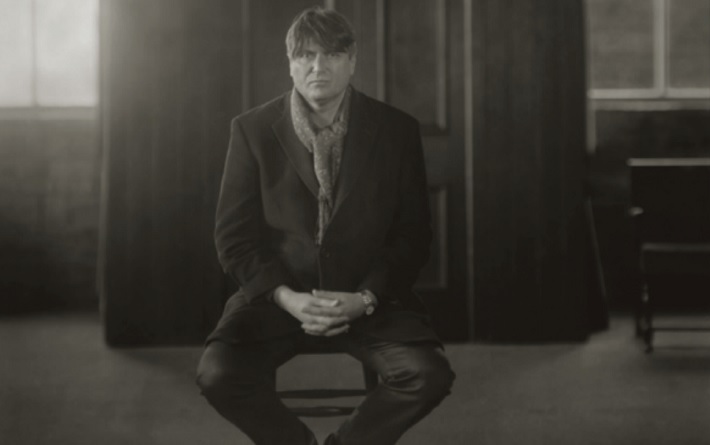An Interview with Simon Armitage

By Barney Bardsley
His is a curious, busy and unusual career path to be sure. From geography student to probation officer to one of the leading poets and writers of his generation. Someone who has not only produced over ten collections of verse, plus three plays, several translations and four volumes of prose, but is also Professor of Poetry at Sheffield University and a leading light in the Poetry Parnassus Olympic celebration, where poets from every competing country will perform on the South Bank and up and down the UK in June and July. It is a massive feat of intellectual selection and organisation. Then there are the broadcasts, articles, interviews… Oh, and he plays in his own band, too. Where does Simon Armitage get his energy?
When I met him recently, face to face, I was struck by two things at once: his apparent self-deprecation, wrapped up inside a slight and unassuming form, and topped with a wry, expressive face; but all underpinned by a distinct toughness and drive. The man is successful, determined. Pure Yorkshire grit.
“Against all the prevailing advice”
 He is out on the road this summer, promoting his new book, Walking Home, a beautiful and engaging memoir of his adventures along the Pennine Way during the summer of 2010. “I don’t think I’ll ever have a better idea than this book”, he tells me, and it is indeed a cracker. In July 2010, Armitage decided to walk the Pennine Way in its entirety – not from south to north, as people usually do it, but the other way round, from Kirk Yetholm on the Scottish-English border, down through Northumberland and the Yorkshire Dales and Derbyshire, towards his home village of Marsden, West Yorkshire.
He is out on the road this summer, promoting his new book, Walking Home, a beautiful and engaging memoir of his adventures along the Pennine Way during the summer of 2010. “I don’t think I’ll ever have a better idea than this book”, he tells me, and it is indeed a cracker. In July 2010, Armitage decided to walk the Pennine Way in its entirety – not from south to north, as people usually do it, but the other way round, from Kirk Yetholm on the Scottish-English border, down through Northumberland and the Yorkshire Dales and Derbyshire, towards his home village of Marsden, West Yorkshire.
Not only would he do this famous journey upside down, and “against all the prevailing advice, against the prevailing weather, and against much of the prevailing signage”, he would also do it alone and without money, relying instead on poetry readings given en route to supply him with some cash, and on willing volunteers to accompany him at stages along the way, and to put him up for the night – giving him a meal, a bed, a packed lunch, in return for the reading of a poem, the signing of a book – and simple gratitude.
“A book about other people”
This is definitely not a twenty first century way of behaving – though Armitage flagged it up in a most contemporary way, flashing news of his impending journey on his website with the following message of intent: “I want to see if I can pay my way from start to finish on the proceeds of my poetry alone. So, it’s basically 256 miles of begging.” The miracle is – it worked. The resulting book is a charming account both of the countryside of the North and the people who inhabit it – brilliant, quirky, dogged characters, who appear, sometimes literally, out of the mists, to help this troubadour poet achieve his mission.
“When I set out”, says Armitage, “I thought ‘this will be a book of my own, about my experiences’, but I think in many ways it turns out to be a book about other people. Sometimes its the communities of towns and villages along the way – and sometimes just the community of the people who walked with me every day. A temporary community.” On a personal level it was a gruelling test of endurance. Not only did he walk miles every day, across terrain sometimes difficult, even frightening, but he had to turn himself around every night to become the performer poet – the polished public persona, speaking sometimes to a handful of people in someone’s front room, sometimes to a hundred or more in a parochial hall, or arts centre, in some far flung town or village.
“Testing my reputation”
Why on earth, I wonder, did he do it – put himself under so much pressure, so much scrutiny – in the first place? “There was a real sense,” he tells me, “of testing my reputation, as to whether or not I had transformed myself into a living, working poet.” This is the man, after all, who has translated Sir Gawain and the Green Knight. He knows a thing or two about quixotic challenges – the need to rise above them, and win. Nonetheless, it is the passages in the book where the man is lonely, lost and afraid, which are the most affecting. And when I ask him how he feels now, two years after his journey, about the whole complicated adventure, he is disarmingly honest. “Well, I’m glad I don’t have to do it again.”
Like Ted Hughes, Simon Armitage is a poet of place. He writes with candour and understanding about his home territory of Yorkshire, in a way that not only puts his subject matter well and truly “on the map”, at a national, even international level, but endears him deeply to his fellow northerners, who – quite rightly – see him as a clever contemporary spokesman for their often ignored and under-represented patch of land.
“Rocks are three-dimensional!”
And it is the landscape itself that inspires him the most. He talks of dipping in and out of the moors and cities of the north, as he goes about his work and life, but it’s the Yorkshire wild that gives most food for his imagination. “There is,” he says, “something contradictory about those landscapes. Occasionally you go to find yourself and you get lost. You go there for comfort sometimes and you get challenged. Sometimes you find solace and contemplation. The one thing is – they are always empty places. They make you think. And it’s rare that I go out into those environments and don’t come back either with a poem or an idea.”
How fitting, then, that his other major project of 2012 should bring together his poetry and the landscape in a bold and concrete way. Stanza Stones – hosted by the Ilkley Literature Festival – is a unique collaboration between Simon Armitage – poet, Pip Hall – stone carver, and Tom Lonsdale – landscape architect, in which poems appear in the terrain from Marsden to Ilkley, carved into the rock and celebrating rain, snow, mist… in short, the prevailing weather of the windy moors. For Armitage this was an entirely new way of working. “It’s one thing writing a poem on a piece of paper, but these rocks are three dimensional.” There is a permanence about the work that takes confidence – even chutzpah. Armitage is undeterred.

“You spend a lot of time in your head”
He likes the idea of reaching out. “People who read poetry books are one kind of person”, he says. “People who stumble across the moor can be a different person – maybe someone who’s got no experience of poetry at all.” He likes this – the notion of making, quite literally, a mark on the world. “ The poems won’t be there for eternity but they will be there for longer than most books! So one theory is that you’re actually writing for people from the future…space people…It has produced a different kind of poem.”
There is something implacable about Simon Armitage that is both pleasing and somewhat daunting. He has a poet’s eye for unseen shadows, as well as a keen sense of the absurd, running like a rich seam through all his conversation. I ask if he prefers writing poetry or prose. The prose – which is often laugh outloud funny – reflects his “everyday” self, he says. The poems take him to an altogether bleaker place. “You sort of brood over them,” he says, “And you spend a lot of time in your head, and I think for most people that eventually takes you to a rather dark place … Our mind is always tending towards the idea that someday, we’re going to die.”
“It’s an indulgence”
But happily, in the meantime, there is so much life teeming through Armitage’s teaching, broadcasting and writing, that we should – as a county – be proud of this most profligate son. When he really wants to lighten up, he writes and sings with his band The Scaremongers. There are eight of them in the band – described, on their website, as “the sound of ageing Huddersfield” – and they have a mellow, rather dreamy vibe, somewhat at odds with Armitage’s more serious writer’s temperament.
Armitage is a great music fan – as his brilliant and weird Guardian interview with Morrissey back in 2010 is testament to – and he admits that it is a great buzz. “It is a luxury”, he smiles. “It’s an indulgence. It’s like being in a five-a-side team. We know we’re not going to win the World Cup, but it’s great fun when we do it.”
As a parting shot, I cannot resist asking him where he is now in his head, with regard to Morrissey – always his icon, but with whom there was a palpable, even painful tension, when he met the recalcitrant Mancunian in person. “I’ll tell you where I am with Morrissey,” he says, somewhat grimly, “NO COMMENT … Although I was listening to him in the car on the way down.” He smiles then. Wry as ever. Always alert to the beautiful ironies of life. So what’s it to be then, a Morrissey song or an Armitage poem? Give me the poetry, every time.
‘Walking Home’ by Simon Armitage (Faber £16.99 hardback / £12.99 ebook)
‘Selected Poems’ by Simon Armitage (Faber, £9.99)
Editor’s note: This interview was conducted in 2012. In 2019 Simon Armitage was appointed Poet Laureate.











POETRY & LITERATURE: Simon Armitage interview – the Huddersfield based poet in conversation with Barney Bardsley … http://t.co/Ay81dvMl